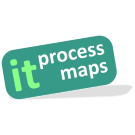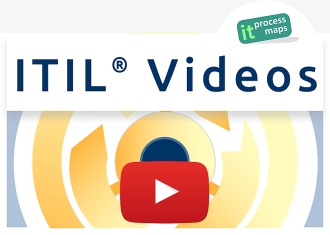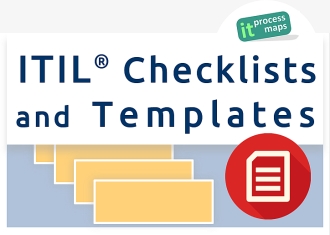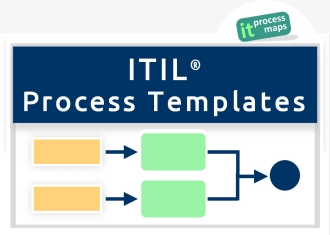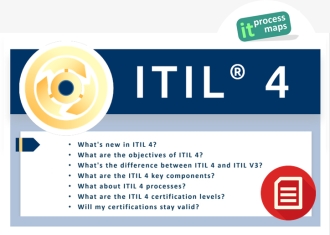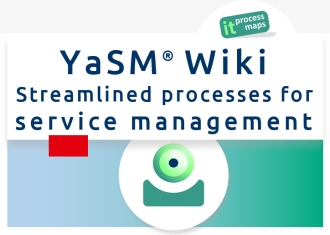ITIL Implementation - Process Design: Difference between revisions
No edit summary |
mNo edit summary |
||
| Line 1: | Line 1: | ||
<seo metakeywords="itil process design, itil process flow" metadescription="ITIL Process Design - Designing ITIL Processes ... a consensus must be reached and documented in the form of detailed process flow diagrams." /> | |||
<imagemap> | |||
Image:ITIL-Wiki-de-es.jpg|DE - ES - ITIL Process Design - Designing the ITIL Processes|100px | |||
rect 0 0 50 30 [https://wiki.de.it-processmaps.com/index.php/ITIL-Implementierung_-_Prozess-Design diese Seite auf Deutsch] | |||
rect 50 0 100 30 [https://wiki.es.it-processmaps.com/index.php/Implementaci%C3%B3n_de_ITIL_-_Dise%C3%B1ando_los_procesos esta página en español] | |||
desc none | |||
</imagemap> | |||
<br style="clear:both;"/> | |||
{| | {| | ||
|- | |||
| style="border-bottom:1px solid grey;" |<big><strong> Step 8: Designing the ITIL Processes in Detail </strong></big> | |||
|} | |} | ||
==== Description ==== | |||
Determining the sequences of single activities within each process is bound to be relatively labour-intensive. This makes it very important to concentrate on the areas which really matter. | Determining the sequences of single activities within each process is bound to be relatively labour-intensive. This makes it very important to concentrate on the areas which really matter. | ||
The detailed activities within the individual processes must be discussed with all relevant parties, in order to include into the design as much experience and knowledge as possible. The Process Owner is responsible for this task. | |||
As a result, a consensus must be reached and documented in the form of detailed process flow diagrams. | |||
The framework of process structure and interfaces for this task was set up within the previous project steps: Due to the prior definition of the project interfaces, it is already established upon which inputs a process may build, and which results it must deliver for successive processes. With this information clearly specified it becomes much easier to define a process flow in a simple, straightforward way. | |||
Additional information to facilitate the process execution, describing procedures or deliverables in detail, can be added in the form of linked [[ITIL-Checklists|checklists/ document templates]]. For example there could be a couple of extra pages describing what sort of information is to be collected during the initial registration of an Incident. | |||
==== Objective of this Project Step ==== | ==== Objective of this Project Step ==== | ||
[[Image:Thumb-itil-process-flow.jpg|frame|right|Detailed Process Descriptions (ITIL process flows)]] | |||
* Detailed definition of the individual activities within the ITIL processes | * Detailed definition of the individual activities within the ITIL processes | ||
* Definition of guidelines/ checklists to support process execution | * Definition of guidelines/ checklists to support process execution | ||
| Line 17: | Line 35: | ||
==== Prerequisites ==== | ==== Prerequisites ==== | ||
* Structure of the Service Management processes to be introduced | * [[ITIL Implementation - Process Structure|Structure of the Service Management processes]] to be introduced | ||
* Process overviews (process breakdown) | * [[ITIL Processes|Process overviews]] (process breakdown) | ||
* Interfaces of the ITIL processes to be introduced | * [[ITIL Implementation - Process Interfaces|Interfaces of the ITIL processes]] to be introduced | ||
* | * [[ITIL Key Performance Indicators|Measures (KPIs) for the ITIL processes]] to be introduced | ||
==== Results/ Deliverables ==== | ==== Results/ Deliverables ==== | ||
* Detailed process descriptions in the form of Event-Driven Process Chains (EPCs) | * Detailed process descriptions in the form of Event-Driven Process Chains (EPCs) | ||
* Guidelines/ checklists | * [[ITIL-Checklists|Guidelines/ checklists]] | ||
* Definitions of the process outputs | * Definitions of the process outputs | ||
==== | ==== Success Factors ==== | ||
* Being well prepared is essential at this point in order to avoid the risk of producing a large number of uncorrelated and oversized documents: Process descriptions should give a clear idea of the required activities and their sequential order, but too many details should be avoided. Too much detail usually means that these documents are soon out of date, as they are too bulky to be an effective tool for the Process Owners. | |||
* It is recommended to confine further details into linked documents (e. g. guidelines and definitions of process outputs). | |||
* It is decisive for a successful process implementation to include all the relevant parties in this phase of the project, in order to make use of their wide range of experiences from daily business, and to ensure that the redesigned processes will be accepted and adhered to. | |||
==== <span style="color:#5d5d5d">Relevant Views of the ITIL Process Map V3</span>==== | |||
[[Image:Thumb-itil-checklist.jpg|frame|right|ITIL checklists are used to enhance the ITIL process flows]] | |||
<span style="color:#5d5d5d">The [https://en.it-processmaps.com/products/itil-process-map.html ITIL Process Map V3] makes detailed process flows available for all ITIL processes (see Figure). These models fulfill the requirements of ITIL and ISO 20000.</span> | |||
<span style="color:#5d5d5d">Modifications will often be necessary to allow for special circumstances or preferences; these alterations are of course permitted, as long as the ITIL guiding ideas are followed.</span> | |||
<span style="color:#5d5d5d">As an addition to the detailed ITIL process flows, checklists/ document templates are available within the ITIL Process Map, describing procedures or process outputs in detail where necessary. We make samples of our checklists/ document templates available for you in this IT Process Wiki: | |||
[[ | See [[ITIL-Checklists#The most sought-after ITIL V3 Checklists|"The most sought-after ITIL V3 Checklists"]]. | ||
'''Following Project Activity''' | |||
→ ITIL Implementation - Step 9: '''[[ITIL Implementation - Implementation|Selection and Implementation of Application Systems]]''' | |||
<!-- This page is assigned to the following categories: --> | |||
[[Category:ITIL V3]][[Category:ITIL implementation]] | |||
<!-- --- --> | |||
Revision as of 20:30, 26 July 2011
<seo metakeywords="itil process design, itil process flow" metadescription="ITIL Process Design - Designing ITIL Processes ... a consensus must be reached and documented in the form of detailed process flow diagrams." />

| Step 8: Designing the ITIL Processes in Detail |
Description
Determining the sequences of single activities within each process is bound to be relatively labour-intensive. This makes it very important to concentrate on the areas which really matter.
The detailed activities within the individual processes must be discussed with all relevant parties, in order to include into the design as much experience and knowledge as possible. The Process Owner is responsible for this task.
As a result, a consensus must be reached and documented in the form of detailed process flow diagrams.
The framework of process structure and interfaces for this task was set up within the previous project steps: Due to the prior definition of the project interfaces, it is already established upon which inputs a process may build, and which results it must deliver for successive processes. With this information clearly specified it becomes much easier to define a process flow in a simple, straightforward way.
Additional information to facilitate the process execution, describing procedures or deliverables in detail, can be added in the form of linked checklists/ document templates. For example there could be a couple of extra pages describing what sort of information is to be collected during the initial registration of an Incident.
Objective of this Project Step
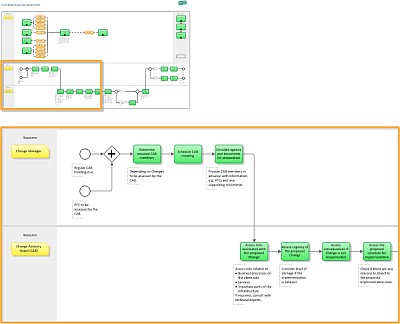
- Detailed definition of the individual activities within the ITIL processes
- Definition of guidelines/ checklists to support process execution
- Detailed definition of the process outputs
Prerequisites
- Structure of the Service Management processes to be introduced
- Process overviews (process breakdown)
- Interfaces of the ITIL processes to be introduced
- Measures (KPIs) for the ITIL processes to be introduced
Results/ Deliverables
- Detailed process descriptions in the form of Event-Driven Process Chains (EPCs)
- Guidelines/ checklists
- Definitions of the process outputs
Success Factors
- Being well prepared is essential at this point in order to avoid the risk of producing a large number of uncorrelated and oversized documents: Process descriptions should give a clear idea of the required activities and their sequential order, but too many details should be avoided. Too much detail usually means that these documents are soon out of date, as they are too bulky to be an effective tool for the Process Owners.
- It is recommended to confine further details into linked documents (e. g. guidelines and definitions of process outputs).
- It is decisive for a successful process implementation to include all the relevant parties in this phase of the project, in order to make use of their wide range of experiences from daily business, and to ensure that the redesigned processes will be accepted and adhered to.
Relevant Views of the ITIL Process Map V3
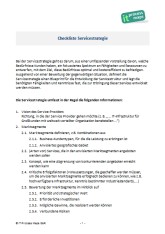
The ITIL Process Map V3 makes detailed process flows available for all ITIL processes (see Figure). These models fulfill the requirements of ITIL and ISO 20000.
Modifications will often be necessary to allow for special circumstances or preferences; these alterations are of course permitted, as long as the ITIL guiding ideas are followed.
As an addition to the detailed ITIL process flows, checklists/ document templates are available within the ITIL Process Map, describing procedures or process outputs in detail where necessary. We make samples of our checklists/ document templates available for you in this IT Process Wiki:
See "The most sought-after ITIL V3 Checklists".
Following Project Activity
→ ITIL Implementation - Step 9: Selection and Implementation of Application Systems
